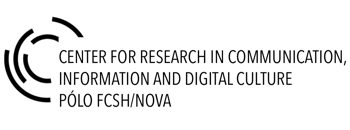Chamada para capítulos: Notícias em Portugal: o discurso da imprensa periódica portuguesa (1641-2000) | Prazo: 5 março, 2017
Organização: Jorge Pedro Sousa ( jpsousa@ufp.edu.pt)
Prazo: 05 de março 2017
Como é que a imprensa periódica portuguesa narrou acontecimentos relevantes para o país e para o mundo? Quais foram os enquadramentos que emergiram do seu discurso? O que é que as notícias do passado revelam sobre a história do jornalismo impresso português e sobre as influências que este sofreu? Quais são os géneros jornalísticos que se detetam na imprensa portuguesa ao longo do tempo? Quais foram as fontes usadas na produção noticiosa? Quais são os dispositivos retóricos que se podem identificar nas notícias dos periódicos do passado? Como é que o contexto influenciou as notícias publicadas na imprensa periódica portuguesa, na forma e no conteúdo, ao longo do tempo? Quais foram as influências internas e externas que, no decorrer dos anos, formataram o jornalismo português? Onde se detetam essas influências no discurso dos periódicos?
Aceitam-se propostas para capítulos a integrar num livro coletivo sobre a história do discurso na imprensa portuguesa (1641- 2000), a publicar em 2018. Pretende-se que o conjunto dos capítulos lance luz sobre a evolução dos géneros, formatos e conteúdos da imprensa portuguesa ao longo do tempo, respondendo às questões colocadas e a outras que sejam pertinentes.
Propostas de capítulos
1. Os interessados deverão enviar um título provisório e um resumo breve do capítulo ou dos capítulos propostos até ao dia 5 de março deste ano (2017), para o email: jpsousa@ufp.edu.pt
2. A aceitação ou rejeição das propostas será comunicada aos autores até ao dia 2 de abril de 2017.
3. Os capítulos aceites deverão ser remetidos para o mesmo endereço eletrónico até ao dia 14 de janeiro de 2018. O livro coletivo deverá ser publicado durante o ano de 2018.
4. Os autores deverão, por norma, possuir o grau de doutor. No caso de capítulos de autoria coletiva, pelo menos um dos autores deverá possuir o grau de doutor.
5. As propostas de capítulos podem ser inéditas ou não. Se os capítulos não forem inéditos, os autores deverão ter autorização de republicação, se for necessária.
6. Os autores serão os únicos responsáveis pelos capítulos que subscreverem.
7. Os capítulos devem ser escritos em português, mas cada autor é livre de seguir a norma linguística que entender (pré-acordo, pós-acordo, do Brasil, de Portugal…). Sugere-se, no entanto, que, por razões de preservação de uma certa uniformidade na obra a publicar, seja preferida a norma pós-acordo ortográfico.
8. Os capítulos devem centrar-se em fenómenos discursivos patentes na imprensa periódica portuguesa entre 1641 e 2000, apresentando, igualmente, o seu contexto. Poderão, contudo, admitir-se capítulos nos quais se façam comparações com fenómenos discursivos na imprensa periódica de outros países.
8. Cada autor poderá contribuir para o livro com um máximo de dois capítulos, mesmo que em coautoria.
Formatação dos capítulos (por favor, respeitar):
– Texto: Microsoft Word.
– Extensão: até 25 páginas (incluindo notas, tabelas, figuras, bibliografia, anexos e apêndices).
– Papel A4 com margens superior, inferior, direita e esquerda de 2 cm.
– Não incluir cabeçalhos e números de página.
– Todas as notas devem ser incluídas como notas de rodapé e nunca como notas de fim de texto.
– Texto escrito em Times New Roman, corpo 12, entrelinhado 1,5, justificado, incluindo bibliografia, sem reentrância de parágrafo. Notas de rodapé em corpo 10, entrelinhado 1, justificado.
– Citações com quatro ou mais linhas deverão ser destacadas do texto com dois espaços verticais no início e no final (mantendo o corpo 12 e o entrelinhado 1,5, justificado) e a 1,5 cm da margem esquerda.
– Para citar, usar o modelo (Apelido, ano: página).
– Todo o capítulo deve conter um título, uma introdução, desenvolvimento, conclusão e bibliografia. Só as partes do desenvolvimento devem ser numeradas.
– Na primeira página, depois do título do capítulo, devem ser incluídos, por autor, as seguintes informações:
– Nome profissional
– Instituição ou instituições
– Correio eletrónico
– Cada autor deverá disponibilizar, em nota de rodapé, um resumo biográfico até três linhas.
– Formatação da bibliografia (não usar itálico, aspas nem sublinhados), em ordem alfabética:
– Livro: APELIDO, N. (ano): Título. Cidade: Editora.
– Capítulo: APELIDO, N. (ano): Título do capítulo. In: APELIDO, N. Título do livro. Cidade: Editora.
– Artigo: APELIDO, N. (ano): Título do artigo. Título da revista. Volume, n.º: página inicial – página final.
– Artigo ou texto online: APELIDO, N. (ano): Título (Online). Consultado em (data da consulta). Disponível em: URL.

